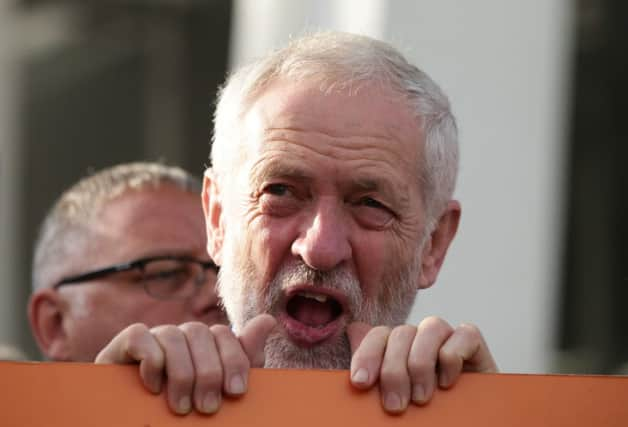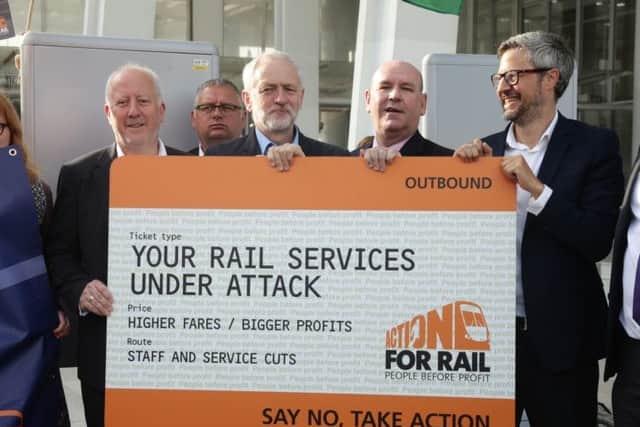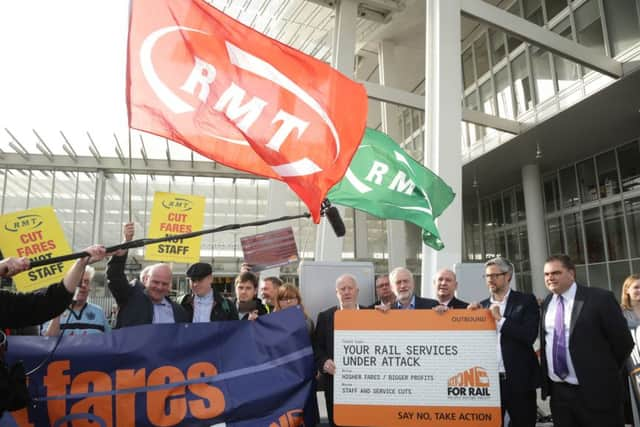Rail fares have risen twice as fast as wages in six years - and they're going up ANOTHER 2%


The analysis by the TUC and the rail unions’ Action for Rail campaign shows that fares have risen by 25 per cent in the last six years, while average weekly earnings have only grown by 12 per cent.
The findings come as the Department for Transport announced that regulated rail fares will go up by another 1.9% next year.
Advertisement
Hide AdAdvertisement
Hide AdThe increase is linked to July’s Retail Price Index measure of inflation, which was confirmed by the Office for National Statistics.


Around half of rail fares are regulated, including season tickets on most commuter journeys, some off-peak return tickets on long distance trips and Anytime tickets around major cities.
Early morning protests against the hike took place outside Sheffield and Barnsley train stations this morning.
Labour leader Jeremy Corbyn held a placard which read “2017 rip off central” at a demonstration outside London Bridge station.
Advertisement
Hide AdAdvertisement
Hide AdAsked how much it would cost to implement his policy of renationalising the railways, he replied: “The cost would be not very much because we would be taking over the franchises as they ran out and handing them over to direct rail to run as train companies.”


TUC General Secretary Frances O’Grady said: “Enough is enough. It’s time for rail services to be publicly owned, saving money for passengers and taxpayers alike. Instead of increasing fares and cutting staff, we should be building an accessible, reliable train service that Britain can be proud of.”
She was backed by a host of rail unions in saying it is time for the Government to seriously consider public ownership of the railways, with TSSA General Secretary Manuel Cortes adding: “It’s time that ministers gave rail passengers a break and actually froze fares in real terms.”
In 2011 average earnings increased by 2.4 per cent while fares rose by 7.1 per cent, however the difference between the two figures has since decreased.
Advertisement
Hide AdAdvertisement
Hide AdIt is expected that this year’s Retail Prices Index (RPI) inflation will be 1.5 per cent, which is the figure the Government uses to calculate ticket price rises.


Chris Hyomes, of campaign group Railfuture who lives in Pontefract, West Yorkshire, said: “The prices are going up across the country every year but for people in the North of England, we are always told that it is for investment in the railways but up until this year we have seen no investment in the North.
“Our trains are still 30 years old.
“With the new Northern Rail franchise we have been told they have ordered new trains but we continue to see investment in London and Crossrail, where as our rolling stock is getting older and older.”
He said the majority of commuter journeys from West Yorkshire into Leeds are carried out on ageing Pacer trains.


Advertisement
Hide AdAdvertisement
Hide AdRailfuture say fares go up unfairly because the Government makes calculations using RPI.
They say it would be fairer to use the Consumer Price Index (CPI) which is used to determine inflation rises for benefits, tax credits, public sector pensions and the state pension.
Brian Dunsby of the Harrgate Line Supporters Group, and former chief executive of Harrogate Chamber of Trade & Commerce, said: “Rail fares are cheaper than ever.
“More and more people are buying advanced fares.
£I’ve no trouble going to London for £30, and that’s first class with a senior rail card.
Advertisement
Hide AdAdvertisement
Hide Ad“Turn-up-and-go fares are getting expensive but if you book in advance, they are not.
Average changes in regulated rail fares over 10 years
• 2007: up 4.7%
• 2008: up 5.1%
• 2009: up 6%
• 2010: down 0.4%
• 2011: up 6.4%
• 2012: up 6.2%
• 2013: up 4.2%
• 2014: up 3%
• 2015: up 2.4%
• 2016: up 0.8%
• 2017: up 1.9%